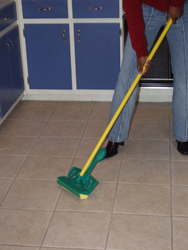Embed Code
Products that contain chemicals that destroy or inactivate microorganisms that cause infections and commercial disinfectants must be registered with the Environmental Protection Agency (EPA).
A disinfectant is a chemical substance or compound used to inactivate or destroy microorganisms on inert surfaces. Disinfection does not necessarily kill all microorganisms, especially resistant bacterial spores; it is less effective than sterilization, which is an extreme physical or chemical process that kills all types of life. Disinfectants are generally distinguished from other antimicrobial agents such as antibiotics, which destroy microorganisms within the body, and antiseptics, which destroy microorganisms on living tissue. Disinfectants are also different from biocides. Biocides are intended to destroy all forms of life, not just microorganisms, whereas disinfectants work by destroying the cell wall of microbes or interfering with their metabolism. It is also a form of decontamination, and can be defined as the process whereby physical or chemical methods are used to reduce the amount of pathogenic microorganisms on a surface.


Disinfectants can also be used to destroy microorganisms on the skin and mucous membrane, as in the medical dictionary historically the word simply meant that it destroys microbes.
Sanitizers are substances that simultaneously clean and disinfect. Disinfectants kill more germs than sanitizers. Disinfectants are frequently used in hospitals, dental surgeries, kitchens, and bathrooms to kill infectious organisms. Sanitizers are mild compared to disinfectants and are used primarily to clean things that are in human contact, whereas disinfectants are concentrated and are used to clean surfaces like floors and building premises.[citation needed]
Bacterial endospores are most resistant to disinfectants, but some fungi, viruses and bacteria also possess some resistance.

In wastewater treatment, a disinfection step with chlorine, ultra-violet (UV) radiation or ozonation can be included as tertiary treatment to remove pathogens from wastewater, for example if it is to be discharged to a river or the sea where there body contact immersion recreations is practiced (Europe) or reused to irrigate golf courses (US). An alternative term used in the sanitation sector for disinfection of waste streams, sewage sludge or fecal sludge is sanitisation or sanitization.[citation needed]





